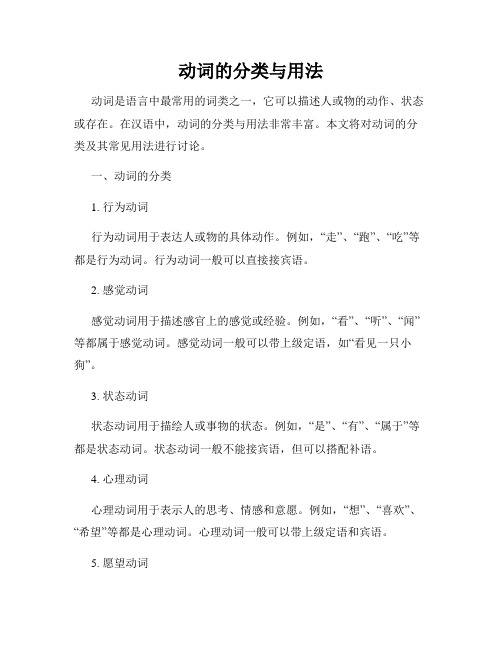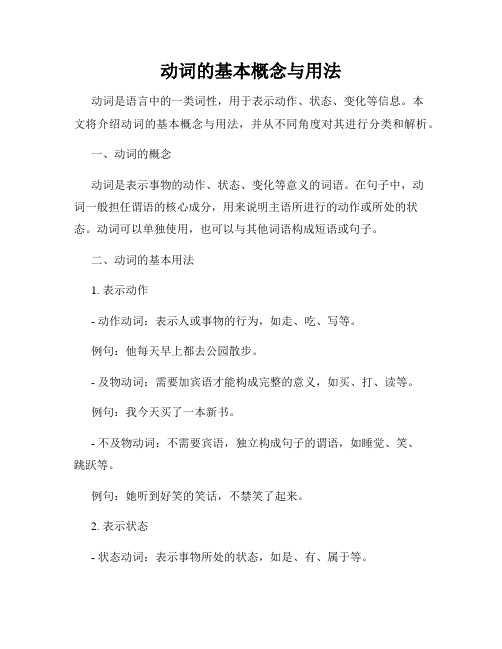动词的分类和时态、动词的被动语态
英文中动词的分类和用法

英文中动词的分类和用法在英语学习中,动词是至关重要的一部分。
动词不仅能够表达动作、状态和行为,还在句子结构和语法规则中起着关键作用。
为了更好地理解和运用英语,我们有必要深入了解英文中动词的分类和用法。
一、动词的分类1、实义动词(Notional Verb)实义动词是表示具体动作或状态的动词,能够独立地充当谓语。
例如:run(跑)、jump(跳)、eat(吃)、sleep(睡觉)、think(思考)等。
实义动词又可以分为及物动词(Transitive Verb)和不及物动词(Intransitive Verb)。
及物动词:后面需要接宾语才能表达完整的意思。
比如,“I love you”中的“love”就是及物动词,“you”是宾语。
不及物动词:自身就能表达完整的意思,不需要宾语。
例如,“The bird flies”中的“flies”就是不及物动词。
2、系动词(Linking Verb)系动词用于连接主语和表语,说明主语的性质、状态、特征等。
常见的系动词有:be(am/is/are/was/were)、seem(似乎)、look(看起来)、sound(听起来)、feel(感觉)、taste(尝起来)、smell(闻起来)等。
例如,“She is beautiful” 中的“is”就是系动词,“beautiful”是表语。
3、助动词(Auxiliary Verb)助动词主要用于协助主要动词构成各种时态、语态、语气等。
常见的助动词有:do/does/did、have/has/had、will/would、shall/should、be (am/is/are/was/were/been/being)等。
例如,“He is doing his homework” 中的“is”就是助动词,“doing”是主要动词。
4、情态动词(Modal Verb)情态动词表示说话人的态度、情感或推测等。
常见的情态动词有:can/could、may/might、must、shall/should、will/would、ought to、need、dare等。
动词知识点汇总

动词知识点汇总一、动词的定义与分类。
1. 定义。
- 动词是表示动作、行为、心理活动或存在变化等的词。
例如“跑”表示一种动作,“爱”表示一种心理活动,“是”表示一种存在关系。
2. 分类。
- 按意义分类。
- 行为动词(实义动词):这类动词表示具体的动作行为。
如“看(kàn)”“写(xiě)”“吃(chī)”等。
它又可以分为及物动词和不及物动词。
- 及物动词:后面必须跟宾语才能使句子意思完整。
例如“我看书(wǒkàn sh ū)”,“看”这个动作作用于“书”这个对象。
- 不及物动词:本身意义完整,后面不需要接宾语。
如“他跑(tā pǎo)”,“跑”这个动作不需要涉及其他对象就能表达完整的意思。
- 系动词:主要用来连接主语和表语,表示主语的特征、状态等。
常见的系动词有“是(shì)”“像(xiàng)”“变得(biàn de)”等。
例如“他是学生(tāshì xué shēng)”,“是”连接了主语“他”和表语“学生”。
- 助动词:用来协助主要动词构成谓语,表示时态、语态、语气等语法意义。
在英语中,像“do/does/did”“will/shall”“have/has/had”等是助动词;在汉语中,像“能(néng)”“会(huì)”“要(yào)”等词有类似助动词的作用。
例如“我能唱歌(wǒnéng chàng gē)”,“能”协助“唱歌”表示能力。
- 情态动词:表示说话人的情感、态度或语气。
英语中的“can”“could”“may”“might”“must”等,汉语中的“应该(yīng gāi)”“必须(bì xū)”等属于情态动词。
例如“你应该努力学习(nǐ yīng gāi nǔlì xuéxí)”,“应该”表达一种劝告的语气。
- 按其在句中的功能分类。
动词的分类与用法

动词的分类与用法动词是语言中最常用的词类之一,它可以描述人或物的动作、状态或存在。
在汉语中,动词的分类与用法非常丰富。
本文将对动词的分类及其常见用法进行讨论。
一、动词的分类1. 行为动词行为动词用于表达人或物的具体动作。
例如,“走”、“跑”、“吃”等都是行为动词。
行为动词一般可以直接接宾语。
2. 感觉动词感觉动词用于描述感官上的感觉或经验。
例如,“看”、“听”、“闻”等都属于感觉动词。
感觉动词一般可以带上级定语,如“看见一只小狗”。
3. 状态动词状态动词用于描绘人或事物的状态。
例如,“是”、“有”、“属于”等都是状态动词。
状态动词一般不能接宾语,但可以搭配补语。
4. 心理动词心理动词用于表示人的思考、情感和意愿。
例如,“想”、“喜欢”、“希望”等都是心理动词。
心理动词一般可以带上级定语和宾语。
5. 愿望动词愿望动词用于表达主观愿望。
例如,“要”、“愿意”、“希望”等都是愿望动词。
愿望动词可以带上级定语和宾语。
6. 变化动词变化动词用于描述事物的变化或演变。
例如,“变成”、“变得”、“出现”等都是变化动词。
变化动词一般不接宾语,而是通过主谓短语来描述变化的结果。
二、动词的用法1. 及物动词与不及物动词及物动词是指需要具体宾语来完成意义的动词,而不及物动词则不需要宾语。
例如,“写”是及物动词,“睡觉”是不及物动词。
2. 能愿动词与情态动词能愿动词表示能力或愿望,而情态动词则用于表示说话者的态度或观点。
例如,“能”、“可以”是能愿动词,“应该”、“会”是情态动词。
3. 连系动词连系动词用于连接主语和表语,并表达主语的状态、性质、身份等。
例如,“是”、“变成”、“变得”等都是连系动词。
4. 动词的时态与语态动词的时态用于表示动作发生的时间,分为一般现在时、过去时以及将来时等。
而动词的语态用于表示动作的主体和客体之间的关系,包括主动语态和被动语态。
5. 动词的派生与构词动词可以通过派生和构词的方式形成新的词语。
动词用法词典

动词用法词典一、引言动词是语言中的重要成分之一,用来表示行为、状态或动作的发生。
动词的用法十分丰富多样,包括时态、语态、情态、短语动词等。
本词典旨在整理和解释常见动词的用法,以帮助读者更准确地理解和运用动词。
二、动词分类1. 情态动词情态动词表示说话人的看法、态度、愿望、建议、命令等,例如can, could, may, might, must, shall, should, will, would等。
2. 及物动词及物动词需要有宾语才能构成句子的完整意义,例如eat, write, teach, help等。
3. 不及物动词不及物动词不需要宾语就能表示完整的意思,例如sleep, laugh, swim, run等。
4. 及物不及物动词有些动词既可以作及物动词使用,也可以作不及物动词使用,例如fall, move, open, break等。
5. 链接动词链接动词用于连接主语和表语,表示主语的状态、特征、属性等,例如be, become, seem, feel, look等。
三、动词时态1. 现在时表示现在或经常性的动作或状态,常用于真理、生活常规等情境,例如I play tennis every Sunday.(我每个星期天都打网球。
)2. 进行时表示正在进行的动作或状态,常用于描述当前正在进行的动作或者强调持续性,例如She is reading a book.(她正在看书。
)3. 过去时表示过去发生或存在的动作或状态,常用于回忆、故事叙述等情境,例如I visited Europe last summer.(我去年夏天去过欧洲。
)4. 完成时表示在过去某个时间已经完成的动作或状态,常用于对比过去与现在的情况,例如She has already finished her homework.(她已经完成了作业。
)5. 未来时表示将来要发生的动作或状态,用于描述将来的计划、安排等,例如I will go to the supermarket tomorrow.(我明天要去超市。
语文知识点动词的分类与用法

语文知识点动词的分类与用法语文知识点:动词的分类与用法动词是汉语的基本词类之一,它可以表示事物的动作、变化或状态。
在语法中,动词被分为多个不同的分类,根据其用法和特点,我们可以更好地理解和运用它们。
在本文中,我们将探讨动词的分类及相应的用法。
一、按照动词的词义分类1. 行为动词:表示人或事物的动作,如吃、跑、写等。
行为动词通常可以用来回答“做什么”这个问题。
例句:我昨天去了一家新开的餐厅,品尝了他们的招牌菜。
2. 状态动词:表示事物的状态或属性,如是、有、存在等。
状态动词通常用来回答“是什么”这个问题。
例句:他是一位非常有才华的作家,他的作品受到了广泛的赞扬。
3. 感叹动词:表示说话人的感叹或感情,如好、棒、太好了等。
感叹动词通常用来表达说话人的主观情感。
例句:这部电影太精彩了,我简直无法用语言来形容。
二、按照动词的能愿性分类1. 实义动词:指行为动词和状态动词,具有实际的意义,能够独立构成谓语。
例句:他每天都去图书馆阅读,不断丰富自己的知识。
2. 系动词:表示主语状态或属性的动词,有时也称为连系动词。
它与主语具有等价的关系,不能独立构成谓语,常与表语连用。
例句:这首诗很美,让人陶醉其中。
三、按照动词的时态分类1. 时态动词:表示动作或状态的发生时间或持续时间,并且与时间有关。
常见的时态动词有过去式、现在式和将来式。
例句:我昨天去了一家新开的餐厅,尝试了他们的特色菜。
2. 非时态动词:表示没有明确时态的动作或状态。
一些动词在用法上没有时态的区分,如喜欢、希望等。
例句:我喜欢看书,它能够带给我无尽的快乐和启发。
四、按照动词的语态分类1. 主动语态:表示主语是动作的执行者。
例句:他写了一篇精彩的文章,引起了广泛的关注。
2. 被动语态:表示主语是动作的接受者。
例句:这本书被出版社赞誉为今年的最佳畅销书。
动词的用法非常广泛,通过了解不同分类的动词和相应的用法,我们可以在日常的语言表达中更加准确地运用动词。
初中英语语-动词详解

与主语在数上一致
He writes well. 第三人称单数
时态
表示动作发生的时间
He wrote a letter to me last month. 过去时态
语态
主语是动作的发生者或者承受者
We study English.主动 The road was filled with rubbish. 被动
②与表示时间或条件的状语从句连用。If you ask him, he will help you.
③ 用于"I expect, I'm sure, I think, I wonder + 宾语从句"中。 I don't think the test will be very difficult.
3.一般将来时
不能独立做谓语,跟主要动词构成谓语,表示疑问,否定及各种时态
He doesn’t speak Chinese. I am watching TV.
情态动词 (mod. v.)
跟动词原形(有自己的词汇意思)
不能独立做谓语。表示说话人语气、情态,无人称和数的变化
We can do it by ourselves. That would be better.
6.现在完成时
A)选用have, has填空: 1.I _______ told him the news. 2.She ________ come back from school. 3.You ________ won the game.
一、按词义和句中的作用,动词可以分为四类
构成方式
举例
动词+介词
Look at, look after
动词的基本概念与用法

动词的基本概念与用法动词是语言中的一类词性,用于表示动作、状态、变化等信息。
本文将介绍动词的基本概念与用法,并从不同角度对其进行分类和解析。
一、动词的概念动词是表示事物的动作、状态、变化等意义的词语。
在句子中,动词一般担任谓语的核心成分,用来说明主语所进行的动作或所处的状态。
动词可以单独使用,也可以与其他词语构成短语或句子。
二、动词的基本用法1. 表示动作- 动作动词:表示人或事物的行为,如走、吃、写等。
例句:他每天早上都去公园散步。
- 及物动词:需要加宾语才能构成完整的意义,如买、打、读等。
例句:我今天买了一本新书。
- 不及物动词:不需要宾语,独立构成句子的谓语,如睡觉、笑、跳跃等。
例句:她听到好笑的笑话,不禁笑了起来。
2. 表示状态- 状态动词:表示事物所处的状态,如是、有、属于等。
例句:这个问题很复杂。
- 表示存在:表示事物存在的情况,如在、有等。
例句:我家里有一只小猫。
3. 表示变化- 变化动词:表示事物发生变化,如变成、变得等。
例句:他变得越来越自信。
- 关系动词:表示两者之间的关系,如是、有等。
例句:婚姻是一种美好的关系。
三、动词的时态和语态动词既可以表达时间的先后顺序,也可表示动作或状态的进行或完成。
1. 时态- 现在时态:表示现在或经常性的动作、状态或客观真理,如写、说等。
例句:他现在在写一篇短文。
- 过去时态:表示过去发生的动作或状态,如走、吃等。
例句:昨天我在公园里散步。
- 将来时态:表示将来要发生的动作或状态,如去、做等。
例句:明天我将去看电影。
2. 语态- 主动语态:表示主语执行动作的语态,如我吃饭、他唱歌等。
例句:我每天早上都吃饭。
- 被动语态:表示主语接受动作的语态,如饭被我吃、歌被他唱等。
例句:这首歌被他唱得很好听。
四、动词的形式变化动词在形式上会发生变化,根据时态、人称和数的差异,它们有不同的形式。
1. 时态变化动词的时态变化主要包括现在时、过去时和将来时的变形。
高中英语动词分类精华讲解

动词的分类动词种类实义动词连系动词助动词情态动词(重点)及物动词不及物动词状态系动词持续系动词表像系动词感官系动词变化系动词终止系动词Be DoShall WillhaveCan MayMust Have toShall WillNeed dare动词形式动词原形过去式过去分词现在分词一般时过去时完成时、被动语态进行时、动词词一、动词的分类按照动词在句中的作用,英语动词可分为四类;实义动词,连系动词,助动词和情态动词。
1、实义动词(行为动词)实义动词(行为动词)说明动作或状态,能独立作谓语,可分为及物动词和不及物动词。
(1)及物动词及物动词必须接宾语,才能有完整的意思,这可以有三种情况;①动词+宾语Her father enjoys warm tea very much in summer.她的父亲夏天非常爱喝热茶。
②动词+间接宾语+直接宾语(直接宾语是谓语动词的承受者,间接宾语表示谓语动作的方向(对谁做)或动作的目标(为谁做),间接宾语紧接在谓语动词后,但它不能单独存在。
)Did he give you a present yesterday?May I ask you a question?③动词+宾语+宾补They call her "Little Li".他们叫她小李。
They elected Bush president.他们选布什当总统(2)不及物动词不及物动词本身有完整的意思其后不需要跟宾语。
例如:His mother works in a hospital.(介词短语做地点)She stayed at home yesterday.(介短)A. 记住下面这些可带双宾语的动词buy, bring, build, cook, cut, draw, find, hand, get, leave, lend,make, offer pay, pass, read,return, show, sell, tell, teach, write等。
- 1、下载文档前请自行甄别文档内容的完整性,平台不提供额外的编辑、内容补充、找答案等附加服务。
- 2、"仅部分预览"的文档,不可在线预览部分如存在完整性等问题,可反馈申请退款(可完整预览的文档不适用该条件!)。
- 3、如文档侵犯您的权益,请联系客服反馈,我们会尽快为您处理(人工客服工作时间:9:00-18:30)。
动词分类和时态一、考点聚焦:动态的时态是历年各省中考英语的必考内容。
每年至少有1道题,甚至有2道或3道时态题。
时态从时间上划分为四大类:①现在时;②过去时;③将来时;④过去将来时。
从行为上,每一类可以分为四种形式;①一般式;②进行时;③完成式;④完成进行时。
这样,英语动词的时态合起来,总值共有十六种,初中只需要掌握其中的八种。
二、用所给动词的适当形式填空。
1. She usually (do) some washing on Sundays2. It (rain) for about two hours and the ground is full of water.3. She asked me if I (have) time that evening4. When I (see) him yesterday, he (talk) to our teacher.5. We (meet) at the school gate at the eight o'clock tomorrow morning.6. I'm sure he (become) a famous doctor some day.7. My brother (tall) off while he (ride) his bike.8. Be quick! They (wait) for us at the bus stop.9. When he (arrive) there, most of the guests (leave).10. you (find) the book which you . (lose) the other day?11. She_ (work) for three years before she (join) the army.12. —(look) for you since lunch time. Where you (be)?—I (be) to the supermarket, anybody (ask) for me? Tom (want) his English book.13. — I don't understand what he (say).—He (say) he (fly) to London.—he (come) back yet?—No, I think he (be) back in two days.二、近三年中考典例1.Rose came to Beijing in 2002. She here for eight years.A. has livedB. was livingC. liveD. will live2. It heavily when I left the cinema.A. rainsB. was rainingC. will rainD. is raining3. --- Would you like to see Avatar with me tonight?--- Thank you very much, but I it already.A. have seenB. am seeingC. seeD. will see4. Tina and her parents to England for sightseeing last summer.A. will goB. goC. wentD. have gone5. Today is Father’s Day. My mother a special dinner for my grandpa now.A. prepareB. preparedC. is preparingD. will prepare6. The Harry Potter books pretty popular since they were published.A. becomeB. have becomeC. are becomingD. will become7. The radio that there will be another heavy rain in Guangdong..A. tellsB. speaksC. talksD. says8. If you to the 2010 Shanghai Expo next week, I will go with you.A. goB. has goneC. are goingD. will go9. 2010 Shanghai Expo people from all over the world to the theme “Better City, Better Life” .A. attendsB. attractsC. allowsD. advises10. --- I hear Sam has gone to Qingdao for his holiday.--- Oh, how nice! Do you know when he ?A. has leftB. was leavingC. had leftD. left三、近三年中考真题、冲击满分1. Go along the street. The museum is just on y our fight. You can’t itA. makeB. findC. missD. fail2. The football team played well, but they didn’t the competition.A. scoreB. doC. succeedD. win3.They her to the party, so she was very happy.A. inviteB. invitedC. will inviteD. are inviting4. The school dance is by the students.A. writtenB. plannedC. writingD. planning5. Diana, together with her friends, Chinese in China.A. studyB. have studiedC. studiesD. are studying6. Miss Gao isn’t here. She to the bus station to meet Mr. Brown.A. goB. has goneC. has beenD. would go7. They had to the 800-meter race because of the bad weather.A. put onB. put offC. get onD. get up8.—Thanks for your wonderful dinner. I have to go now.—It’s raining hard. Don’t until it stops.A. arriveB. stayC. comeD. 1eave9. This silk dress so smooth. It’s made in China.A. tastesB. smellsC. soundsD. feels10. My friend me. I have to leave now.A. waits forB. waited forC. is waiting forD. was waiting for11.Keep practicing and you your English.A. improveB. will improveC. improvedD. were improving12. Sally, your sunglasses. The sun is so bright.A. put onB. put upC. put awayD. put down13. —When Jessy to New York? —Yesterday.A. does; getB. did; getC. has; gotD. had; got14. Sam Chinese since he came to China. He speaks good Chinese now.A. 1earnsB. 1earnedC. has learnedD. will learn15. Don’t others. Sometimes you make mistakes, too.A. knock atB. 1augh atC. 1ook atD. arrive at16. —How clean the bedroom is!—Yes. I am sure that someone it.A. cleansB. cleanedC. has cleanedD. had cleaned17.—Hi, Tony. The milk shake good!—I’m glad you like it.A. soundsB. fallsC. goesD. tastes18. It’s a good habit a walk after dinner.A. to comeB. to beC. to takeD. to go19. We also learn how to well with others at schoo1.A. get toB. get onC. get downD. get up20. He his bicycle when it began to rain.A. was ridingB. is ridingC. has riddenD. rides21. Don’t your hope and try again.A. give upB. 1ook upC. cheer upD. wake up22. —How long can I the book?—For three weeks. But you can’t lend it to others.A. seeB. borrowC. keepD. 1ook23. Prison Break is the best American TV play that I these years.A. watchB. will watchC. have watchedD. was watching24. I to the room when there was a knock at the door.A. had beenB. am comingC. was goingD. has gone25. I love to go to the seaside in summer. It good to lie in the sun or swim in the water.A. doesB. feelsC. getsD. makes26. The car doesn't work. What we ?A. do; doB. are doingC. shall; doD. did; do27. I won't return the book to the library because I reading it.A. wasn't finishB. don't finishC. won't finishD. haven't finished28. Hi, Mr. Smith. I didn't know you were in New York. How long here?A. have you comeB. were youC. have you beenD. will you come29. --You seem to know much about the city.--That's true. I it three times.A. visitedB. had visitedC. have visitedD. will visit30. He told me he care of my child while I away.A. will take; amB. took; wasC. would take ; wasD. has taken; am31. This week, the weather to change every day: One day is hot, the next is cold.A. seemsB. looksC. soundsD. feels32. After discussing, the students some good ideas to work on the project.A. put upB. set upC. caught up withD. came up with33. I told my mother I wasn't worried about my exam. But in fact I .A. didB. wasC. have34. --China's 24th science research team at Changcheng Station on January 5, 2008.--Wonderful! Our scientists a lot in this field already.A. have arrived; improvedB. arrived ; has improvedC. arrived ; have improved35. --What a nice model ship!--Thank you. It me three days to make it.A. paidB. spentC. tookD. wasted36. --Nancy, don't always that old jacket. It looks terrible.--But I think it's cool, Morn.A. wearB. dressC. put onD. take off37. Nick a new camera. He has taken lots of pictures with it.A. buysB. is buyingC. boughtD. will buy38.--When your mother you that blue dress, Mary?--Sorry, I really can't remember.A. does; buyB. has; boughtC. had; boughtD. did; buy39. --Why did you come back so early.?--The English party has been till next Friday.A. put onB. put offC. put awayD. put out40. We were in Qingdao last week and great fun there.A. will haveB. have hadC. hadD. have41. --Linda, when shall we take a walk?--After I finish the dishes.A. washB. washedC. to washD. washing42. --What did the teacher say just now?--Sorry. I didn’t catch it. I something else.A. thinkB. will thinkC. was thinkingD. had thought43. The dress smooth and soft.A. feltB. feelsC. is feltD. is feeling四、综合能力提升训练:(一)单项选择( )1. Tom and Mike are good friends. _______ often help each others.A. TheyB. ThemC. TheirD. Theirs( )2. Some volunteers from Beijing arrived in Shanghai ________ April 29 to work for the World Expo.A. onB. atC. ofD. to( )3. The reading room ________ very quiet. I enjoy reading books there.A. amB. isC. areD. be( )4. —________ schoolbag is this? —I guess it’s Lily’s.A. WhatB. WhoC. WhoseD. Which( )5. —Which color do you like ________, blue or green? —Blue.A. goodB. betterC. bestD. the best( )6. There is ________ wrong with this computer. It doesn’t work well.A. somethingB. anythingC. everythingD. nothing( )7. —________ you turn down your radio, please?—Yes, I can.A. MayB. NeedC. MustD. Can( )8. —Would you like to go to the concert with me?—I’d love to, ________ I’m afraid I have no time.A. soB. orC. andD. but( )9. —What’s your father doing now?—He ______ the roomA. cleanedB. cleansC. has cleanedD. is cleaning( )10. Tom will call me as soon as he ________ home.A. getsB. has gotC. gotD. will get三) 中考高频词组、句型翻译:67. 许多中国人想通过不同的方法来提高英语。
